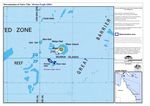 Print this page Print this page | ||
Andrew Passi on behalf of the Meriam People v State of Queensland [2001] FCA 697 (14 June 2001) | ||
| Binomial Name: | Federal Court of Australia | |
| Date: | 14 June 2001 | |
| Sub Category: | Consent Determination (Native Title Act) | |
| Place: | Waier and Dauar Islands, Torres Strait | |
| Click this link to search this location with google maps | ||
| State/Country: | Queensland, Australia | |
| Click this link to search this location with google maps | ||
| The determination area comprises the whole of land and inland waters of Waier Island and Dauar Island on the landward side of the high water mark. | ||
| Legal Status: | Registered on the National Native Title Register o | |
| Legal Reference: | Federal Court No: 6024/98; National Native Title T | |
| Alternative Names: | ||
| Subject Matter: | Native Title | Recognition of Traditional Rights and Interests | Recognition of Native Title or Traditional Ownership | |
| URL: | http://www.austlii.edu.au/cgi-bin/disp.pl/au/cases/cth/federal%5fct/2001/697.html?query=title+%28+%22passi%22+%29 | |
| Summary Information: | ||
| Andrew Passi on behalf of the Meriam People v State of Queensland [2001] FCA 697 Between: Andrew Passi on behalf of the Meriam People (APPLICANT) AND State of Queensland (RESPONDENT) Judge: Chief Justice Black Where: Dauar Island in the Torres Strait Determination: Native title exists in the determination area. The area covered by the determination is shown on the Native Title Determination Plan Number AP5177 and includes the whole of the land and inland water of Waier Island and Dauar Island on the landward side of the high water mark. | ||
| Detailed Information: | ||
| The Meriam People were the applicants in Mabo v Queensland [No 2] (1992) 175 CLR 1, however the land subject to this consent determination was expressly put to one side and excluded from the finding in that case. The original application to the National Native Title Tribunal was lodged on behalf of the Dauwereb People, a subgroup of the Meriam People, on 24 June 1998, shortly before amendments were made to the Native Title Act 1993 by the Native Title Amendment Act 1998. On 26 October the parties were referred by the Tribunal to mediation in accordance with the Native Title Act 1993. The mediation was successful and consequently Chief Justice Black made a consent determination finding that the Meriam people held native title. The native title is to be held on trust for the Meriam People by the Mer Gedkem Le (Torres Strait Islanders) Corporation. The consent determination declared that the Meriam People were the common law holders of the land in the claim area. The communal and group rights and interests which comprise native title ensure the Meriam People may posses, occupy, use and enjoy the land to the exclusion of all others subject to their traditional laws and customs and the operation of valid laws of the Commonwealth and State of Queensland. The nature and extent of these rights was explored in further detail by Chief Justice Black in the consent determination. As with the majority of consent determinations, the orders were made in respect of land that was either unallocated crown land, reserved land or land already held by, or for the benefit of, Aboriginal or Torres Strait Islander People. The claim related to two islands, Dauer and Waier, which were not permanently inhabited at that time but were deemed to have been 'occupied' for the purposes of the Native Title Act 1993 by Chief Justice Black. Other interests in the area were recognised by the consent determination. They include the rights and interests of both Papua New Guinea and Australia in the claim area protected by the Treaty between Australia and the Independent State of Papua New Guinea concerning the area known as the Torres Strait, and Related Matters. The Crown and the State of Queensland also hold interests pursuant to any statute or valid executive or legislative act that was current at the date of this determination. The rights and interests of other parties prevail over the rights and interests of the native title holders when they cannot exist concurrently. | ||
| ||||
| ||||
|
Was this useful? Click here to fill in the ATNS survey

 Andrew Passi on behalf of the Meriam People v State of Queensland [2001] FCA 697 (14 June 2001) Map - (
Andrew Passi on behalf of the Meriam People v State of Queensland [2001] FCA 697 (14 June 2001) Map - ( 